The Refill Revolution
Why is plastic made?
Because we use it.
It’s as simple as that.
It’s Plastic-Free July, and we’re looking at some of the things we can do to reduce the amount of plastic waste we generate in our daily lives.
Excessive packaging has become a habit. We hardly notice it anymore. But habits are never set in stone. They’re as flexible as plastic itself. After all, the word “plastic” derives from the Ancient Greek plassein, “to mould”.
What is a revolution?
From Latin revolvere, “to roll back (re, “back” + volvere “to roll”), a revolution is a wide-reaching change in conditions or attitudes – a radical shift in social or political structure.
The concept of rolling back is particularly apt when thinking about the refill revolution. We get a sense of time folding back on itself, to the days when milk bottles were routinely returned and refilled; when sweets, vegetables, meat, tea, sugar, salt, soap, and other daily commodities were purchased loose; when we carried our shopping in reusable bags; to the days when our dustbins weren’t so full.
The Refill app
Developed by the UK-based environmental agency, City to Sea, the free Refill app has already connected 300,000 consumers with 274,000 refill stations all over the world, and millions of pieces of plastic have been kept out of the system. Thousands of refill stations are offering free water refills, saving, to date, 100,000,000 plastic bottles.
Hot drinks refill
In a 2019 report by the House of Commons Environment Audit Committee, the focus was on single-use coffee cups.
The UK coffee industry is growing rapidly. Almost half of all coffees and hot drinks are now sold in disposable cups. There are more than four times as many coffee shops today as there were in the year 2000, and 1 in 5 of us visit a coffee shop every day. Coffee is also widely available in supermarkets and garages.
Disposable coffee cups are made from a paper fibre that’s tightly bonded with a polyethylene lining. Although each of these materials is, in theory, recyclable, coffee cups are seldom recycled. Tax-payers’ funds just won’t stretch to the expensive task of separating the materials.
Many coffee shops are now inviting customers to use their own reusable cups, and, in many cases, rewarding refill customers with a discount. As more and more coffee shops sign up to the Refill campaign, the annual number of single-use coffee cups is being whittled down.
Free water refills
More than 250,000 outlets, globally, are offering free water refills.
One of these refill stations belongs to RHC (Rhubarb Hospitality Collection). Earlier this year, RHC installed an Aqua Link system at The Market, in London’s famous skyscraper, 22 Bishopsgate, London.
“We were impressed with the energy-efficiency of the system and its low running costs, and we liked the idea of distributing water through pipes from one centralised point.”
RHC shares our own commitment to a sustainable economy.
“When it comes to water, our goal is to provide fresh, great-tasting water in a sustainable way. We’re looking to roll out the hydration solutions across all the other sites and to drive our sustainability programme forward.”
Contact us
To talk to us about Aqua Libra Co water dispensers, call 0800 080 6696 or email [email protected]. For a quote, please complete the online quote form.
Share
